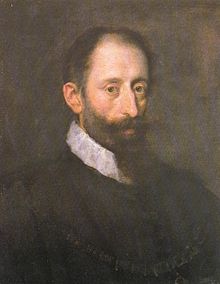William V of Bavaria
| William V | |
|---|---|

William V, Duke of Bavaria
(portrait by Hans von Aachen) |
|
| Duke of Bavaria | |
| Reign | 24 October 1579 – 15 October 1597 (abdication) |
| Predecessor | Albert V |
| Successor | Maximilian I |
| Born |
29 September 1548 Landshut |
| Died | 7 February 1626 (aged 77) Schleissheim Palace |
| Burial | St. Michael's Church, Munich |
| Spouse | Renata of Lorraine |
| Issue |
Maximilian I, Elector of Bavaria Maria Anna of Bavaria Philipp William, Bishop of Regensburg Ferdinand of Bavaria Karl of Bavaria Albert VI of Bavaria Magdalene of Bavaria |
| House | House of Wittelsbach |
| Father | Albert V, Duke of Bavaria |
| Mother | Anna of Austria |
| Religion | Roman Catholicism |
William V (29 September 1548 – 7 February 1626), called the Pious, (German: Wilhelm V., der Fromme, Herzog von Bayern) was Duke of Bavaria from 1579 to 1597.
William was born in Landshut, the son of Albert V and Anna of Austria (1528-1590).
He received a Jesuit education and showed keen attachment to the Jesuit Counter Reformation tenets. His title 'the Pious' was given to him because he devoted his daily routine to masses (when possible, several times a day), prayer, contemplation, and devotional reading. He took part in public devotions, processions, and pilgrimages.
His residence as crown prince was the ancient fortified Wittelsbach seat Trausnitz Castle in Landshut. Its upgrading from a Gothic fortification into a renaissance complex of truly representational proportions including the construction of an arcaded inner court were achieved in the decade between 1568 and 1578.
Like his Wittelsbach father and grandfather, William was a strong supporter of the counter-reformation. He secured the archbishopric of Cologne for his brother Ernest with his campaign in 1583; his brother Ferdinand commanded the Bavarian army in the first 18 months of the Cologne War in an effort to secure the Electorate. Eventually, the Spanish army, under the command of Alexander Farnese, Duke of Parma expelled the Calvinist contender for the Electorate, Gebhard Truchsess von Waldburg, and Ernst secured sole possession of both the Electorate and the Archdiocese of Cologne. This dignity remained in the possession of the family for nearly 200 years. Two of his sons also followed ecclesiastical careers: Philipp Wilhelm became the Bishop of Regensburg and eventually a Cardinal, and Ferdinand succeeded his uncle, to become Archbishop of Cologne. In 1591, Wilhelm also expelled Salzburg from the Berchtesgaden Provostry, the future possession of his son Ferdinand.
...
Wikipedia
